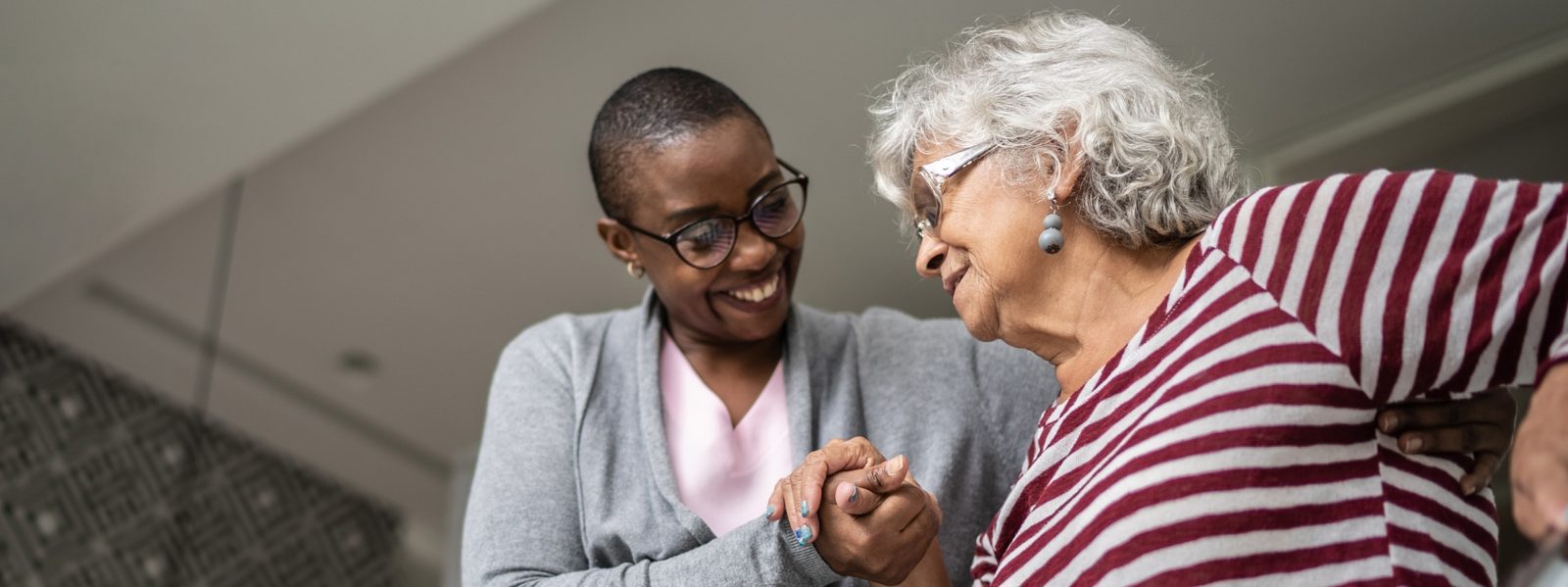
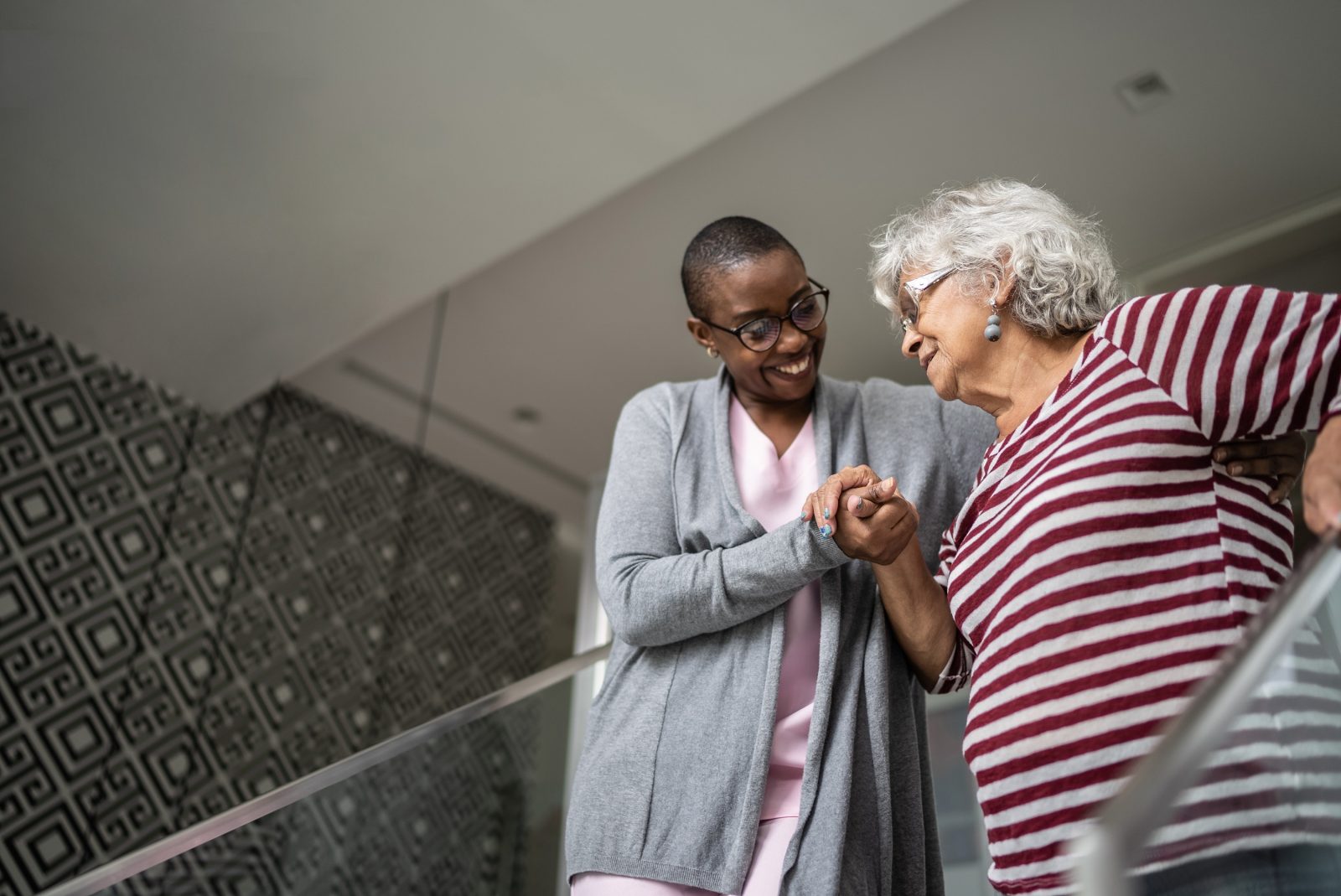
Stroke Care – SYNERGY HomeCare of Tucson, AZ
SYNERGY HomeCare of Tucson understands the importance of supportive stroke care. With the right help, you can return home safely after a stroke. The idea of returning home from the hospital or rehabilitation facility can be stressful. SYNERGY HomeCare can be your partner at home, providing the support you need to live safely and confidently. The stroke care plan varies depending upon your needs. You can receive the care you need as you recover, and you can reduce the level of care over time. You can continue to receive the level of care you need to safely maintain your independence in your own home. For those people who want to remain at home, but require ongoing help, we offer long term care for stroke patients.
Critical Components of Stroke Recovery Care
The first three months after a stroke are a critical window of time for stroke patients to regain lost motor skills. Intensive therapy and care are necessary during this period. Optimal stroke recovery care includes several key components:
Rehabilitation – Stroke rehabilitation will typically include physical therapy, occupational therapy, and speech therapy. This therapy is designed to help you regain function as quickly as possible and to navigate daily tasks. Licensed therapists will visit you in your home, but therapy sessions will typically be less frequent than at the rehabilitation facility. Caregivers can assist daily with therapy plans in your home.
![]() Safety Supervision – A stroke may affect motor skills, vision, memory, speech, and/or hearing. These impairments will create new challenges that did not exist before the stroke. Routine activities may present risks to safety and wellbeing. Caregivers help navigate these risks — walking throughout the home, showering, toileting, etc. These risks can increase at night if disoriented upon waking. Caregivers can create a safer environment by removing trip and fall hazards and recommending supportive devices.
Safety Supervision – A stroke may affect motor skills, vision, memory, speech, and/or hearing. These impairments will create new challenges that did not exist before the stroke. Routine activities may present risks to safety and wellbeing. Caregivers help navigate these risks — walking throughout the home, showering, toileting, etc. These risks can increase at night if disoriented upon waking. Caregivers can create a safer environment by removing trip and fall hazards and recommending supportive devices.
Medical Care – The hospital and rehabilitation staff should create a comprehensive care plan that includes medications, diet, monitoring of vital signs, and follow up appointments. Following this plan is necessary for recovery and preventing additional strokes. Caregivers help ensure that these steps are followed.
Lifestyle Changes – Lifestyle choices often play a roll in triggering a stroke. It is not always easy to make the necessary changes despite the obvious health benefits. Caregivers can prepare healthy meals. They can help limit unhealthy choices.
Emotional Support – The road to recovery following a stroke can be long and arduous.
It is very natural for someone to become frustrated and even depressed. The stroke is often an unexpected, life-changing event for an otherwise healthy, independent person. Caregivers can be there to provide comfort during difficult times as well as share in the triumphs. Caregivers also provide motivation and encouragement to complete ongoing therapy. The caregiver can be your partner in the recovery process.
Recovery Support in Your Own Home
SYNERGY HomeCare caregivers are trained in, and have experience with, Activities of Daily Living (ADL’s) and Instrumental Activities of Daily Living (IADL’s). This means that you or your loved one will receive professional assistance with normal daily activities during stroke recovery, and after as needed.
Safety Supervision – Strokes can impair motor skills, balance, and vision. Caregivers can help prevent falls by assisting with walking, including reminders to use a walker and other supportive devices. If there are stairs in the home, caregivers can assist up and down.
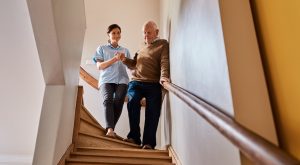
Toileting – Caregivers assist with toileting and incontinence care. They are there to lend a hand, providing as much assistance as necessary. Caregivers understand that this is a very personal activity and are sensitive to the issues of privacy and pride.
Bathing – Following a stroke, bathing and showering may present both risks and challenges. The bathroom itself is one of the most dangerous places in the home. Caregivers provide hands on help and can recommend devices to make the environment and experience safer, including installing grab bars in the best locations and using an appropriate shower bench. Caregivers can provide as much assistance bathing and showering as needed – from standby safety assist to washing hard-to-reach places.
Dressing – Putting on or taking off clothing may be difficult following a stroke. Caregivers can assist with dressing in the morning and undressing at night. Caregivers allow you or your loved one to dress with as much or as little assistance as needed or desired.
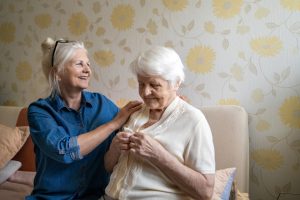
Transfer Assistance – Getting in and out of bed may be more difficult. Caregivers can assist with morning and evening activities, as well as getting into or out of a chair and using the toilet. Caregivers are trained in safe transfer techniques and on using supportive devices such as gait belts, Sara Stedy Sit to Stand, and Hoyer Lifts.

Medication Reminders – There will likely be medication changes following a stroke. Caregivers help ensure that medications are taken on schedule. This is important for stroke recovery and to prevent future strokes.
![]()
![]() Personal Hygiene – Simple daily activities like brushing teeth, combing hair, putting on deodorant, putting in/taking out dentures, and putting on hearing aids can be challenging after a stroke. Caregivers can assist with these things as needed.
Personal Hygiene – Simple daily activities like brushing teeth, combing hair, putting on deodorant, putting in/taking out dentures, and putting on hearing aids can be challenging after a stroke. Caregivers can assist with these things as needed.
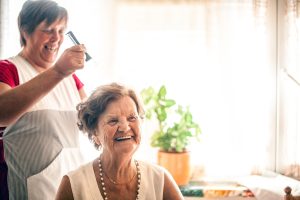
Monitor Vital Signs – Following a stroke, monitoring of vital signs is advised by medical staff. Vital signs help monitor overall health and can help identify issues before they become critical. These include blood pressure, temperature, blood glucose, oxygen level, and weight. Caregivers can measure and record vitals daily, thereby providing valuable information for nurses and doctors.
Eating – A stroke may make it difficult to use eating utensils or hold a cup or glass, and make it more difficult to swallow. Caregivers can provide help eating, including everything lending a hand for stability to direct feeding.
Meal Preparation – Stroke recovery may include changes to diet, including food consistency and eating healthier foods. Caregivers can prepare both healthy meals and softer foods as necessary for easier swallowing. They can also encourage beverages such as Ensure® to aid in caloric intake and increasing protein, vitamins, and minerals in the diet.
Hydration – Staying well hydrated is important for all of us living in Tucson, but particularly important for the elderly and those recovering from a stroke. Proper hydration is critical for brain and muscle health. It is also important for the prevention of urinary tract infections (UTI’s) which are more common among the elderly.
Housekeeping – When recovering from a stroke, housekeeping chores can be more challenging and consume energy that is better spent on therapy. We often have unique ways in which we want specific tasks to be done in our own home. Caregivers not only take away the physical burden of housekeeping, but they can also do it under your direction to ensure that dish washing, dusting, laundry, etc. is done according to your wishes.
Transportation – Driving may be more difficult or even impossible after a stroke. Caregivers can run errands or provide transportation to medical appointments, hair stylists, stores, and friends.

Companionship – Recovering from a stroke can be both physically and emotionally draining. Having a trusted caregiver there during tough times can help lift spirits. And caregivers can engage in games and your favorite activities.
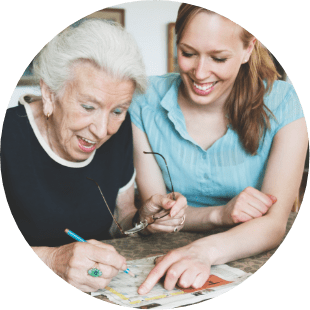
CUSTOMIZED STROKE CARE
Starting service with SYNERGY HomeCare is very easy. We will meet you at the hospital, inpatient rehabilitation facility, or your home to start service. This meeting is an opportunity for us to understand your needs and your situation. And it is an opportunity for you to become comfortable with us as a provider of home care and ask any questions you have. We can schedule this meeting for whenever it is most convenient for you. This is no obligation around this meeting and there is no cost to you.
At this assessment meeting, we will ask questions about your current health situation as well as your health history. We will perform a safety review of your home and we will provide recommendations to create an even safer environment. We will inquire about family caregivers and other involved family members and friends. It is important for us to understand you as a person. We want to provide the best caregiver fit.
This meeting will create the basis for your customized stroke care plan. It will allow our staff to understand your unique needs. This is a dynamic care plan – it will change and evolve as your condition improves.
Each day, caregivers enter notes related to the care plan. Family members can access these care notes if desired. And unique questions can be created for an individual client.
FLEXIBLE CARE SCHEDULES
SYNERGY HomeCare provides the care that you need when you need it. We can provide help just a few hours per day all the way up to 24/7 care. And there is no contract or commitment, you can change your schedule with 24-hour notice. This means that you can adjust your care schedule as your needs decrease or when you have family or friends available to assist you.
STARTING YOUR HOME CARE JOURNEY
Getting started with SYNERGY HomeCare is easy:
- Contact Us: Reach out via our website or phone to schedule a consultation.
- Comprehensive Assessment: We’ll conduct a thorough assessment to understand your needs and develop a personalized care plan.
- Caregiver Match: Our office staff will match you with caregivers best suited to provide the care you require.
- Care Commences: Your in-home caregiving begins delivering personalized care, ensuring safety and well-being.
CONTACT US FOR STROKE HOME CARE SERVICES
Discover the highest quality in-home stroke care services in Tucson with SYNERGY HomeCare. Contact us today to learn how we can support you or your loved one in the recovery process to provide for a return to a safe, fulfilling life at home.
Let SYNERGY HomeCare be your partner in compassionate in-home care. We look forward to serving your family with the dedication and expertise you deserve.
Call us at 520-327-2771 – 24 hours a day, 7 days a week. We are happy to answer any questions you have.
